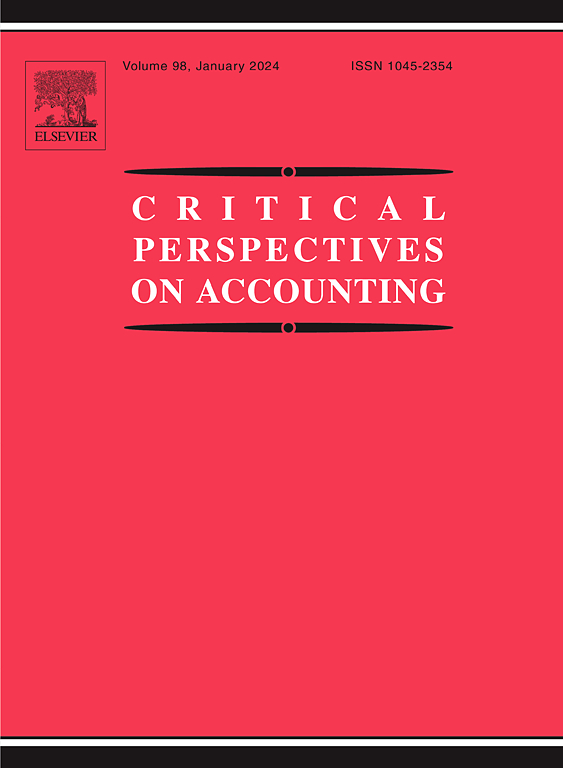Atmosphere of measurement, consumable tools and the affective life of neoliberalism
IF 5.7
2区 管理学
Q1 BUSINESS, FINANCE
引用次数: 0
Abstract
This article examines the links between accounting tools, affects and neoliberalism. To explain how accounting tools participate in the affective life of neoliberalism, we conducted longitudinal qualitative research on the health and social care sector in Quebec and examined the links between accounting tools and affects in a context of a neoliberal reform. We use the concept of atmosphere − collective affects present in a given space − to address the collective and spatial dimensions of affects linked to accounting tools. Our study shows that the omnipresence of accounting tools in spaces nurtures the atmosphere of measurement presented here. In this atmosphere, tools are viewed as consumables that could be replaced by newer tools, whereas the idea of quantification, supported by feelings of hope, receives support and endures over time. Our paper calls for broader application of the concept of atmosphere to better understand the affective dimension of neoliberal society.
测量的氛围,可消费的工具和新自由主义的情感生活
本文探讨了会计工具、影响和新自由主义之间的联系。为了解释会计工具如何参与新自由主义的情感生活,我们对魁北克的卫生和社会保健部门进行了纵向定性研究,并在新自由主义改革的背景下检查了会计工具与影响之间的联系。我们使用大气的概念——特定空间中存在的集体影响——来解决与会计工具相关的影响的集体和空间维度。我们的研究表明,空间中会计工具的无所不在滋养了这里所呈现的测量氛围。在这种氛围中,工具被视为消耗品,可以被更新的工具所取代,而量化的想法,在希望的支持下,得到支持,并随着时间的推移而持续下去。我们的论文呼吁更广泛地应用氛围的概念,以更好地理解新自由主义社会的情感维度。
本文章由计算机程序翻译,如有差异,请以英文原文为准。
求助全文
约1分钟内获得全文
求助全文
来源期刊

Critical Perspectives on Accounting
BUSINESS, FINANCE-
CiteScore
9.40
自引率
7.80%
发文量
91
期刊介绍:
Critical Perspectives on Accounting aims to provide a forum for the growing number of accounting researchers and practitioners who realize that conventional theory and practice is ill-suited to the challenges of the modern environment, and that accounting practices and corporate behavior are inextricably connected with many allocative, distributive, social, and ecological problems of our era. From such concerns, a new literature is emerging that seeks to reformulate corporate, social, and political activity, and the theoretical and practical means by which we apprehend and affect that activity. Research Areas Include: • Studies involving the political economy of accounting, critical accounting, radical accounting, and accounting''s implication in the exercise of power • Financial accounting''s role in the processes of international capital formation, including its impact on stock market stability and international banking activities • Management accounting''s role in organizing the labor process • The relationship between accounting and the state in various social formations • Studies of accounting''s historical role, as a means of "remembering" the subject''s social and conflictual character • The role of accounting in establishing "real" democracy at work and other domains of life • Accounting''s adjudicative function in international exchanges, such as that of the Third World debt • Antagonisms between the social and private character of accounting, such as conflicts of interest in the audit process • The identification of new constituencies for radical and critical accounting information • Accounting''s involvement in gender and class conflicts in the workplace • The interplay between accounting, social conflict, industrialization, bureaucracy, and technocracy • Reappraisals of the role of accounting as a science and technology • Critical reviews of "useful" scientific knowledge about organizations
 求助内容:
求助内容: 应助结果提醒方式:
应助结果提醒方式:


